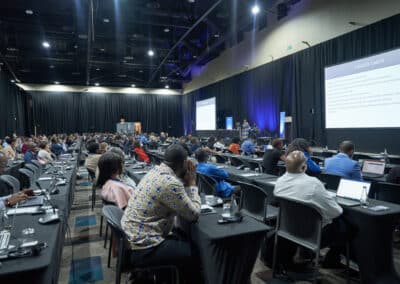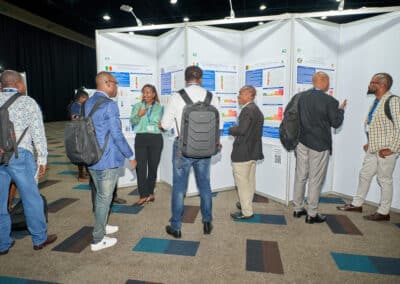Nigeria’s differentiated drug distribution (DDD) community pharmacy model is of high interest to other CQUIN network countries and has become one of the most frequently requested subjects of country-to-country visits. Three countries have visited Nigeria in the past year to observe the model that has helped the country maintain a 70 percent enrolment on 6MMD in one of its States – Akwa Ibom.
Clement Adesigbin, MD, is the Care and Treatment lead for Nigeria’s National AIDS and STIs Control Program (NASCP). He talks about the successes and challenges of the model and gives some recommendations for countries interested in implementing a similar model in this Q&A.
Several CQUIN member countries have been fascinated by your DDD community pharmacy model and have requested visits to see its implementation. What have been the successes of the model?
We can attribute the model’s success to the convenience and ease of access to medication that it provides for recipients of care. People can receive multi-month antiretroviral treatment (ART) and other screening services in any community pharmacy of choice. Another success is the inclusion of the model in our National DSD Operational Manual. Although various implementing partners primarily support the design and implementation of our community pharmacy model, the operational manual is a guiding document that has been essential to the facilitation, coordination, adoption, and scale-up of the model and other community-based DSD models in the country. We implemented our DDD model sporadically between 2016 and 2019 but scaled up during the COVID-19 pandemic in 2020.
What have been some of the challenges with implementing this DDD model?
Because we work with private pharmacies, the pharmacy ART pick-up service is provided at a small user fee of either NGN500 Nigerian Naira ($1) or NGN1000 ($2). However, some community pharmacists do not strictly adhere to this agreed user fee and sometimes utilize the opportunity to advertise and sell additional medications, such as supplements, to the clients. Furthermore, the availability of a proper storage facility for the ART medication is a challenge for some pharmacies since they must store several months of supply at a time; this limits the number of community pharmacies that can be engaged in the program. In addition, while the NASCP monitors and supervises the pharmacies routinely to ensure efficiency, poor documentation remains a challenge.
What advice do you have for countries in the initial stages of implementing a similar model?
I would advise countries to engage the national and regional body of pharmacists and community pharmacists (CPs) from the beginning in the model’s planning, implementation, and evaluation. Do not leave anyone behind is the rule of the game, most especially the umbrella body of the recipients of care, like the national networks of people living with HIV. A situational analysis is also critical to answering many unknown questions – are the CPs acceptable by communities, are the CPs willing to participate, what infrastructure and resources do they have, and are there structures in place to support this community intervention? Countries should also identify knowledge and human resource gaps. Policy documents that include training and M&E tools would need to be updated or developed. Countries should also consider categorizing CPs based on what role they will play. For instance, some CPs will only serve as ART refill points, some as testers, and some will have multiple functions and roles. When that is determined, the MOH will have a better idea of how to build capacity in accordance with the identified roles. Finally, monitoring and supervising the participating community pharmacies is essential.
——-
This interview is part of the series: Perspectives on Differentiated Service Delivery. The series explores expert views and insights into the importance of differentiated service delivery in Africa and their unique challenges in advancing services for people living with HIV.
For more on the community pharmacy model, join our August 9 webinar.






